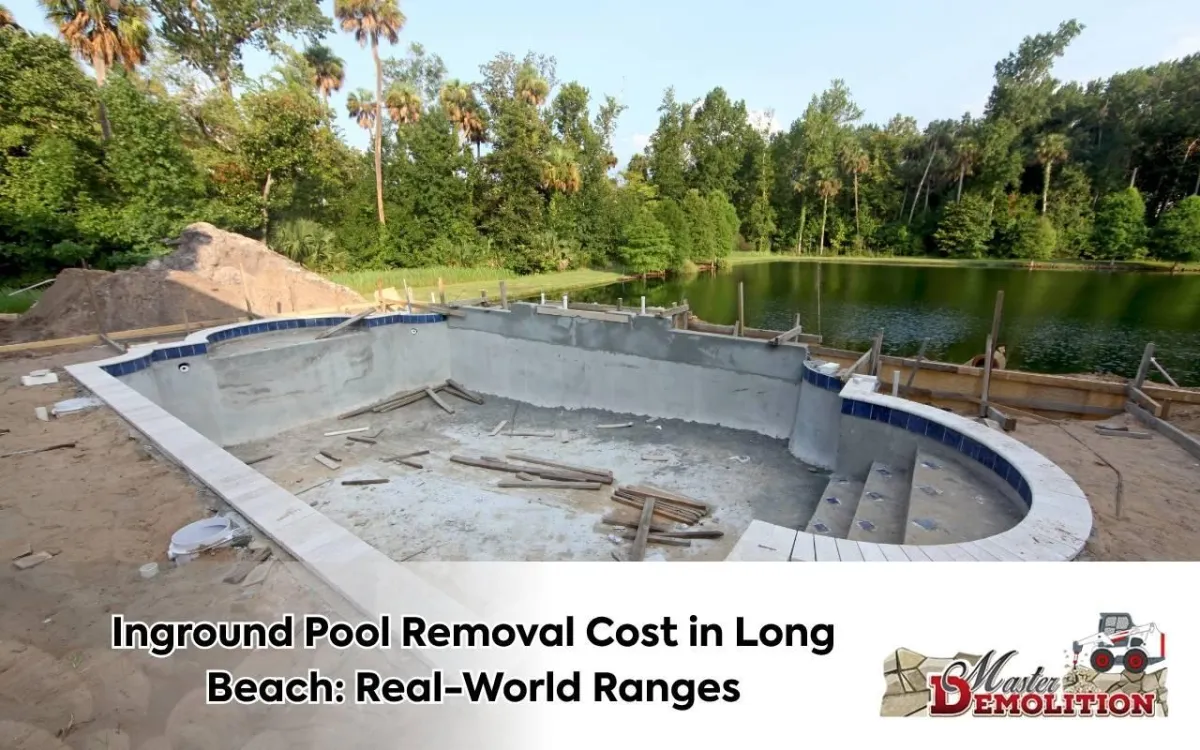
Inground Pool Removal Cost in Long Beach: Real-World Ranges
For many homeowners in Long Beach, the decision to remove an inground pool is often met with both apprehension and relief. As the allure of maintaining a personal oasis fades, practical considerations like inground pool removal cost Long Beach can weigh heavily on your mind. The choice between partial versus full removal, combined with backfill, access challenges, dirt hauling, and compaction, can feel daunting. Those sparkling waters that once promised endless summer fun may now represent expenses, maintenance burdens, and unused backyard space. Understanding the intricacies of removal empowers you to make an informed choice. Whether you want a lush garden, a safe play area, or reduced upkeep, knowing the costs involved is the first step toward unlocking the potential of your home.
Factors Affecting Inground Pool Removal Cost
Several variables play into the overall inground pool removal cost Long Beach homeowners face. Pool size and material strongly influence demolition complexity. A small gunite pool requires different machinery than a large vinyl shell. The choice between partial and full removal matters greatly. Site conditions, including soil and drainage, also shape the process. Access issues often determine if heavy equipment can reach your yard or if manual labor is needed. Local regulations and permitting requirements may add administrative costs. Finally, after debris removal, proper compaction is essential to stabilize soil. All these elements combine to shape the final estimate.
Average Cost of Partial Inground Pool Removal
Draining and cleaning the pool
Capping plumbing lines
Breaking the shell below ground level
Dirt hauling and backfilling
Compaction and grading
Partial removal remains budget-friendly. Although DIY enthusiasts may try this approach, professionals ensure compaction and grading are done correctly. Contractors also manage permits and debris disposal, making the process smoother.
Average Cost of Full Inground Pool Removal
Complete excavation of the pool shell
Hauling away all debris
Addressing plumbing and electrical systems
Backfilling with clean fill
Ensuring compaction and structural stability
Full inground pool removal eliminates all risks of future ground collapse. Though more expensive, it provides a versatile yard surface ready for landscaping or new construction.
Cost Breakdown: Backfill, Access Challenges, and Compaction
When considering inground pool removal cost Long Beach, expenses include backfill, access, and compaction. Backfill material depends on pool size and soil conditions. Limited access may require specialized equipment, increasing labor and hauling costs. Lastly, proper compaction is vital to prevent future soil shifting. Investing upfront avoids long-term maintenance issues.
Savings from DIY vs. Hiring Professionals
DIY removal may seem appealing. Renting jackhammers or mini-excavators lowers labor costs, but risks are high. Buried utilities or improper compaction can extend the project timeline and cause expensive repairs. Licensed professionals manage permits, inspections, and soil stability, offering peace of mind and compliance with codes. Their liability insurance also protects you from damage claims.
Environmental Considerations and Additional Fees
Recycling concrete and rebar
Special handling of vinyl liners
Permitting fees and inspections
Dewatering permits when groundwater is present
Safe disposal of hazardous equipment
Environmental guidelines in Long Beach control how debris and chemicals are managed. Responsible disposal reduces landfill impact while keeping your project compliant.
Hidden Costs to Watch Out For
Unexpected challenges can surface after work begins. Tree roots wrapped around structures or underground utilities may raise costs. Soil contamination from chemicals could demand remediation. Heavy rains may also require erosion control measures. To minimize surprises, request a thorough site inspection and contingency estimate before signing a contract.
FAQs About Pool Removal in Long Beach
Can I remove my pool without a permit?
Most Long Beach neighborhoods require permits for pool removal. Always check with local authorities before beginning.
What is the difference between partial and full removal?
Partial removal leaves parts of the shell underground, while full removal hauls away all materials and fills the cavity completely.
How long does the pool removal process take?
Depending on access and pool size, removal can take from several days to a few weeks.
Is professional compaction really necessary?
Yes, professional compaction prevents soil settling and ensures a stable surface for landscaping or construction.
Can I reuse the space for building after removal?
Full removal provides a stable foundation suitable for future structures, while partial removal is often best for landscaping.
Reimagining Your Outdoor Space
After removal, homeowners often redesign their backyards with gardens, patios, or safe play areas. Landscaping with drought-tolerant plants is especially popular in coastal climates. Consider transforming your yard into a versatile outdoor space that boosts property value. To explore professional solutions, visit our long beach pool demolition page or learn more about pool demolition services.
Evaluating ROI After Pool Removal
Removing an unused pool can increase property value and broaden buyer appeal. Many potential buyers see pools as high-maintenance liabilities. By saving on yearly upkeep and offering a clean, level yard, you create a more attractive property. Review sales data and consult real estate professionals to gauge the return on investment. For personalized guidance, contact us directly through our contact master demolition page.
Making an Informed Decision
Deciding on inground pool removal cost Long Beach involves evaluating removal type, access challenges, environmental concerns, and ROI. With thorough planning and professional guidance, you can turn an unused pool into a functional, safe, and beautiful outdoor space. This decision enhances your lifestyle while strengthening long-term property value.




